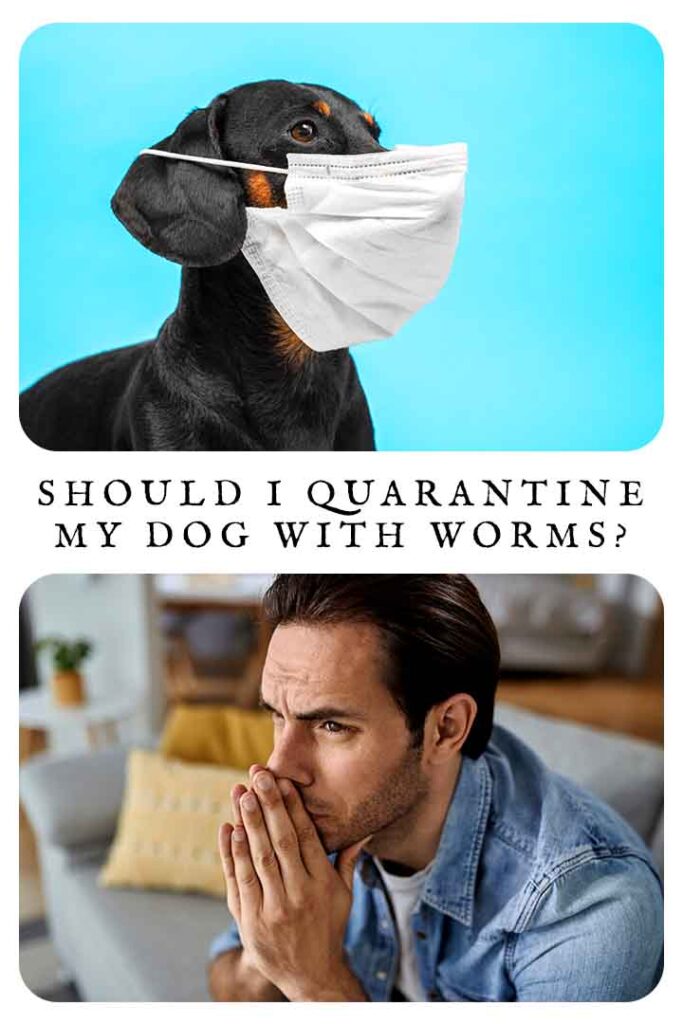Parasitic worm infections are unpleasant for our dogs, and pretty gross for us to deal with too. But should I quarantine my dog with worms on top of giving him a dewormer? And if I can’t get to the vet, would quarantining be enough? The good news is, dogs with worms don’t usually need quarantining. But it is a good idea to take some extra hygiene precautions while they’re infected. Importantly, quarantining alone is not enough to get rid of an infection.
Contents
- Should I quarantine my dog with worms?
- How do dogs and people get worms
- What to do when your dog has worms
- Should I quarantine my dog with worms until they see a vet?
- Should I quarantine my dog with worms while he’s being treated?
- Preventing worms in dogs
Should I Quarantine My Dog With Worms?
Dogs can be infected by several species of parasitic worm, most of which take up residence in their digestive tract. They survive by either consuming the partially digested food as it passes through, or latching onto the gut wall and drinking the dog’s blood. Some dog worms, such as whipworms, are not zoonotic. That means they can’t be passed on to people. But others are zoonotic, which means they can be passed from your dog to you, and infect you in the same way. Examples of zoonotic worm infections include:
- Roundworms
- Tapeworms
In between, there are worms like hookworms, which can infect humans at some stages of their life cycle, but are generally less of a risk to us than to dogs. Unless your vet tells you otherwise, even zoonotic and semi-zoonotic worm infections can be treated without quarantining your dog.

How Do Dogs And People Get Worms?
Both humans and other animals can contract some worms from dogs. But not all worms are transmitted between species in the same way.
Roundworm is passed on by swallowing the microscopic eggs in an infected dog’s poop. It happens between dogs when they sniff, lick or eat an infected dog’s poop. In humans it happens when someone touches infected dog poop, or a place where it has been, then eats with their hands or bites their nails, for example. Strict hand washing is the most effective way to avoid infection.
Tapeworms are slightly different. They can’t be passed directly from dog to dog or dog to human. They rely on intermediate hosts such as fleas or rats, so controlling those species is the most effective way to avoid infection for both of you.
Help! I Think My Dog Has Worms
Infections with parasitic worms are usually spotted because:
- You’ve seen the worms being passed in your dog’s poop.
- You’ve seen the worms crawling around your dog’s anus.
- Your dog is scooting around on their butt to relieve the itching.
- Your dog is losing weight, vomiting, passing watering poop or becoming lethargic, and you’ve asked a veterinarian for help.
If your dog gets worms, your vet will prescribe a course of deworming tablets, to kill the worms. Since the worms are in the digestive system, deworming tablets reach them and start to take effect pretty rapidly – usually within a matter of hours. But should you isolate your dog from other pets and people until the infection is treated?
Should I Quarantine My Dog With Worms Until They See The Vet?
If you think your dog may have worms, they could potentially be passing on the infection in their poop until they are treated. It’s not necessary to quarantine them unless you have another dog who is generally very preoccupied with sniffing their butt. In this case, it is a good idea to keep the two dogs separate, so that the second dog doesn’t pick up eggs on his nose and lick them off. It is also a good idea to mention the habit to the vet – they are likely to give both dogs dewormer, as a precaution.
While you are waiting to see the vet, wash your hands regularly, and after every time you pet your dog or clean up his poop. Try to restrict where your dog has his bowel movements, and dispose of them immediately. Don’t let children play where he has pooped, and make sure they wash their hands after petting him and before every meal.
Should I Quarantine My Dog With Worms While He’s Being Treated?
When the dewormer takes effect, your dog will start to pass dead worms and eggs in their poop. Some segments of worm may be visible, but for the most part a lot of what they pass will be too small to see. Unless your veterinarian tells you otherwise, your dog with worms doesn’t need to be quarantined during treatment, but you should:
- Restrict where your dog goes to the toilet, and clear away feces promptly.
- Wash your hands regularly, and especially after petting your dog, clearing away their poop, or touching anywhere they have pooped (for example after doing yard work).
- Make sure any children living with the dog are extra diligent about handwashing and avoiding possible infection.
- Look out for symptoms of worms in yourself and family members, and see a pharmacist promptly if you think you might have them. The main symptom is intense itching around your anus, especially at night.
- If your dog has been diagnosed with tapeworm, take steps to get rid of any fleas from your home as well, by washing all bedding and soft furnishings and vacuuming thoroughly.
Prevention Is Better Than Cure
As with so many things, preventing worm infections in the first place is much less stressful than treating them, or worrying about quarantine if your dog gets infected.
- Treat your dog with a dewormer and flea preventative every month, without fail.
- Practice scrupulous hygiene, and teach your kids to do the same.
- Pick up your dog’s poop straight away, and don’t let your kids play in the same spot.
Should I quarantine my dog with worms – summary
If you find out that your dog is infected by worms, it’s important to take quick protective measures. This means a trip to the vet for them. It might also mean limiting what contact they have with other dogs or children in your household, to stop the infection spreading. But it is not strictly necessary to quarantine a dog with worms. They’re likely to be feeling quite sorry for themselves already, so treat them with your usual love and affection to reassure them. Luckily, worm infections are stopped in their tracks pretty quickly by prescription dewormers from your vet and scrupulous hygiene.
Has your dog had worms?
What extra steps did you take to stop them being passed on? Let us know in the comments box down below, and lend a helping hand to someone tackling worms for the first time!
More articles on health
- Is your dog getting enough sleep?
- Is it safe to bathe an unvaccinated puppy?
- Understanding hip scores
- Will pansies make my dog sick?
References
- Awadallah and Salem. Zoonotic enteric parasites transmitted from dogs in Egypt with special concern to Toxocara canis infection. Veterinary World. 2015.
- Sabry and Lotfy. Captive dogs as reservoirs of some zoonotic parasites. Research Journal of Parasitology. 2009.
- Gates and Nolan. Endoparasite prevalence and recurrence across different age groups of dogs and cats. Veterinary Parasitology. 2009.
- Guillot & Bouree. Zoonotic worms from carnivorous pets: risk assessment and prevention. Bulletin de L’academie Nationale de Medecine. 2007.

